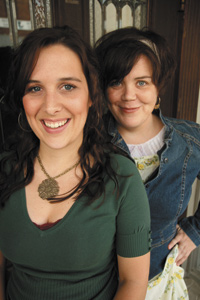By Jewly Hight
At the heart of Old Black Kettle are three harmonizing female voices that do justice to the band’s name. That’s not to say their sound is rough and heavy like some big iron vessel over a fire—the sweet, reviving quality of Sarah Siskind, Julie Lee and Jodi Haynes’ close vocal blend evokes the group’s namesake, a Dolly Parton song with a homespun sound and a rustic, nostalgic theme, from her 1973 album My Tennessee Mountain Home.
It’s also fitting that the easy consonance of the harmonies on the band’s new live album, Old Black Kettle Live, breath new life into songs Siskind and Lee long since laid aside. It hearkens back to a more old-timey, mountain-bred sound than what either singer-songwriter presently does in her solo repertoire. And, the joined voices give a nod to the group’s musical heritage in another way: Haynes is the daughter of revered country singer Connie Smith, who Parton famously called one of “really only three female singers in the world.” (For the record, Parton didn’t include herself in that number.)
The prophetical nature of the band’s six degrees isn’t lost on Siskind. “We joke around that maybe one night Dolly will come and see [a show], because it’s named after one of her songs,” she says. “I mean, it’s probably a lofty dream, but it would complete the circle. Although, we would be shaking in our boots.”
OBK—a sextet rounded out by multitalented string men Lex Price and Kenny Hutson (covering mandolin, Dobro, bouzouki and various guitars between them) and bassist Jake Bradley—grew out of the vocal affinity Lee and Siskind discovered onstage during each other’s sets.
“We started out singing harmony with each other in our solo configurations,” Siskind says. “[The band] started as just a four-piece and it was Julie and me and her sideman and my sideman. We were like, ‘Well, this would be fun to put a little repertoire together and do some private parties.’ It was just something to do on the side. So we started doing that and had a lot of fun. We said, ‘Well, why don’t we try to do a show at Station Inn just for fun. Let’s try some three-part harmonies and really make it a fuller sound.’ After one show live in front of an audience, we were hooked.”
Haynes’ honeyed lilt—less full-bodied than her mother’s, but no less of a pleasure to the ear—proved to be the magical third element. It’s a rare moment when Haynes sings lead, but on this 12-song live set she duets with Bradley’s even-keeled baritone on the Hank Williams number “I Can’t Help It,” delivering the part that Anita Carter once sang. “[Jodi] probably on average sings one song a show, maybe two if we’re lucky,” says Siskind. “In the last five or six months, we have really tried to pull her to the front a little bit more.”
Even though OBK primarily does songs Siskind or Lee have written, the band thing is something a bit different than each of their solo performances. Siskind’s music straddles subtle electronic experimentation and acoustic simplicity, as evidenced by the pair of EPs she released in 2006, aptly titled Studio and Living Room.
“I have sort of a double life as an artist,” she says. Lee has been in a vintage acoustic jazz headspace of late, but only a few traces of that jaunty vibe carry over here, namely through the effervescent oohs and swinging ukulele of “Little Evening Star,” which also appears on her Take Me Out to Hear the Band album.
Several of Siskind’s songs included here have devastating, bluesy—though not strictly bluegrass—hooks, like “Daddy,” with its curling, keening melody and pleading lyrics. And “Wildfire,” with its tension-building minor-to-major shifts, is an example of an older original becoming more potent when revisited with OBK’s harmonies.
“I had stopped playing it live because I had just moved on,” Siskind says. “I dug way back into my catalog and brought it into the set and now it’s one of our most requested songs. Because it is a fun side project, we’re not taking it so seriously where we’re like, ‘Let’s express exactly what we’re feeling artistically at this present time.’ It’s more like this is an outlet for us to try out as much material as we want.”
The collective performances and recordings—captured between July 2006 and May 2007 at The Station Inn—aren’t all pristine. (“Like ‘In the Mountaintops to Roam,’ the sound quality wasn’t up to the standard of later shows, but we put it on there because it represented a really nice energy,” Siskind says) Nor are the vocals entirely flawless—it is a real flesh-and-blood live recording, after all. But the three distinct voices—with Siskind’s reedy alto doing the most ornate runs, Lee’s bright soprano cutting through on high notes and Haynes pure singing slipping smoothly into place—join to remarkable results.
Says Siskind, “There’s something about the particular blend of our three voices that sort of gels into one if we’re in the right zone—if we’re having a good night.”





